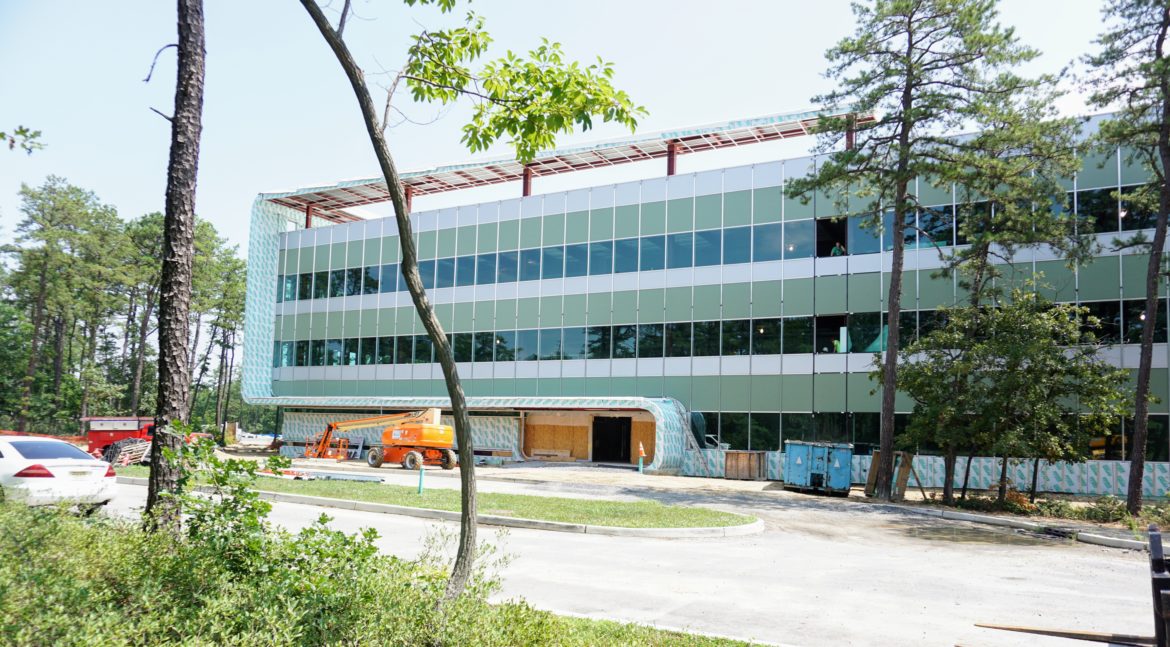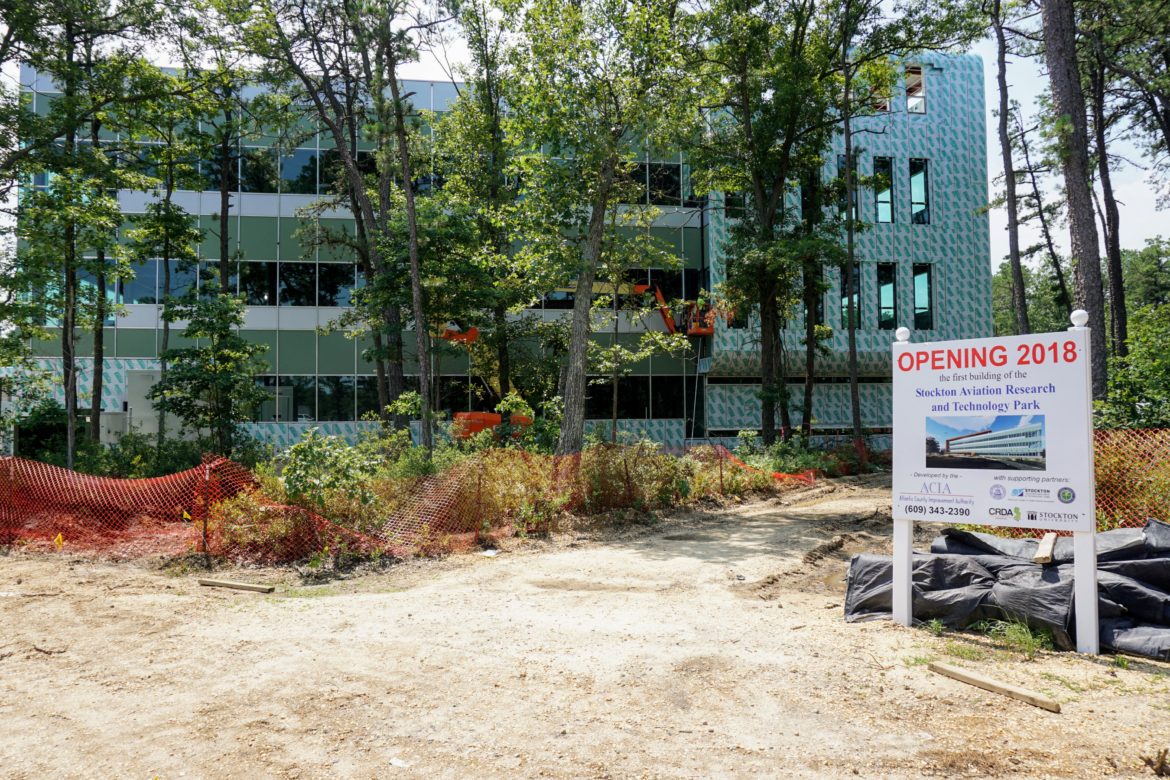Atlantic County officials expect to announce shortly the signing of a lease at the soon-to-open National Aviation Research & Technology Park in Egg Harbor Township. The county sees the research park as one piece of a new regional economy it is hoping to piece together, after the collapse of Atlantic City’s casino industry earlier this decade.
“We’re hopeful to make some announcements soon in the aviation district with some companies that we’re going to be attracting,” Lauren Moore, executive director of the Atlantic County Economic Alliance, said in an interview. Moore said he could not give any details about the kinds of companies that might be drawn to the space because the lease negotiations were confidential. But he added, “I’m going to say we’re getting very, very close.”
After renaming the project this year (formerly it was the Stockton Aviation Research & Technology Park) the coalition of agencies overseeing the site is also in talks with a research university that would also lease laboratory space in the first building, according to Howard Kyle, chief of staff for Atlantic County.
“We are actively finalizing something on that,” Kyle said. The name change broadened the identification of the park outside of Atlantic County, he said, adding that working with a research university should also further boost the park in marketing discussions. Stockton University does not have research status. Questions put to Stockton about the park were referred to the county.

The first building at the park.
The first building of the NARTP, which sits on land leased from the existing Federal Aviation Administration’s William J. Hughes Technical Center, is set to open in October. The project broke ground last May, after more than a decade of planning. When the whole park is completed (target date unknown) it will be home to a total of seven buildings with more than 400,000 square feet of space, employing more than 2,000 professionals and technicians. (The FAA employs about 3,000 people at its tech center.)
A “major company” was interested in occupying most of the building, according to minutes of the Atlantic County Improvement Authority’s board meetings in February, which also reported interest from two other companies. The ACIA hired broker Colliers International last summer to find tenants for the space, but so far the FAA is the only confirmed tenant. “Three or four of us wake up every day to work on this,” Kyle said. “It’s very tedious, methodical, it takes a lot of time.” The county has been having discussions with aerospace companies Boeing and Lockheed Martin about the project, Kyle said.
The FAA will use its lab at the park to work with the National Institute of Aerospace, a consortium of research universities, Kyle said. The FAA is leasing its space in the park as part of a funding deal backed by the Casino Reinvestment Development Authority in return for the FAA’s leasing of the park’s acreage.
The $22 million research park got off the ground as a collaboration between various local agencies, including Stockton University, CRDA, the ACIA and with debt financing from the county. The construction is running to schedule, Kyle said, but the project has not been without its problems. The cost of the park has rocketed as design changes were made to the first building. The ACIA awarded engineering firm AECOM a nearly $700,000 contract back in March 2016 to design the first building. Since then the cost of the design work has ballooned by more than a third to almost $1 million. The executive director of the project, Joseph Sheairs, resigned last year. It has since been helmed by two interim directors.
The research park has long been seen as a way for Atlantic County to diversify its casino-centered economy by helping existing institutions partner with the FAA’s tech center.
“We have an antiquated view that because Atlantic City once was the driving force of the economy it still has to be that,” Kyle said. “It can’t be that any more… we have to integrate Atlantic City into a regional economy.” Building out the aviation industry around the airport and new research park is key to both spreading jobs outside of Atlantic City and establishing a regional economy with multiple industries. Another piece of the attempt to build up the aviation industry is a project to launch an aviation maintenance school at the airport, in partnership with Atlantic Cape Community College. Kyle said that the county is also working to build out air cargo operations at the airport. A company that brings more than $1 billion of produce into the United States through Miami airport is considering moving its cargo business to Atlantic City International Airport because it’s cheaper, the air traffic is less congested and it is closer to the company’s markets, Kyle said.
Economic incentives are the carrot the county wants to use to lure these businesses. One package of tax breaks and incentives that would apply to an aviation district at the airport is currently on Governor Phil Murphy’s desk. Murphy has ordered a state-wide audit of incentives and has talked skeptically about the use of large, unspecific incentives by the previous governor. It is not clear if he will sign the aviation district legislation, Kyle said. “Hopefully he’ll sign it, we’ve made every effort, we’ve met with members of his staff, we’ve done everything we can to show the value of it,” Kyle said. “These incentives are tailored to a small geographic area and technology-based companies and technology-based jobs; everything that he says he wants to do, so this is fundamentally different than the old incentive package.”
The federal Opportunity Zone project would apply to the Atlantic City airport area and it would create additional funding opportunities, Kyle said. But the details of how the Opportunity Zone funding will work are still to be worked out by the Internal Revenue Service.
Not far away from Atlantic County, more aviation industry space is being developed. Cape May County Airport Business Park is building a 20,000 square foot Tech Village that will focus on drone development. Cape May County has hired officials from the Atlantic County Improvement Authority under an inter-governmental agreement to oversee that project.
“We are trying to change the entire dynamic of an area and we’re doing it without much outside assistance right now,” Kyle said. “It’s difficult work and it’s time-consuming work and it is challenging work, but I’m highly motivated myself. And I’m beginning to see now things starting to fall into place.”

Pingback: Beach Concerts, School Funding, Aviation Parks – Wednesday’s Roundup | Route 40